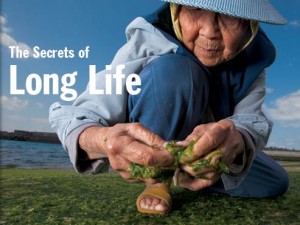Longevity is a goal most of us strive for, and in most of our minds the keys to accomplishing this consists of being happy, eating healthy, and not stressing too much. However, it appears that these common assumptions made by people are in fact wrong. In a recent article published by Science Daily (which can be found here), they reported the findings of a twenty year study about longevity and the results are not what we would expect.

Image from: http://ngm.nationalgeographic.com/ngm/0511/feature1/index.html
The study, which is called “The Longevity Project”, was conducted by a group of scientists at the University of California, Riverside (UCR). These scientists examined, and refined previously collected data by Stanford University. The data which was initiated back in 1921, documented the lives of over 1500 children as they grew, starting from the age of ten. The children were studied throughout their lives, and information regarding family histories, relationships, hobbies, pet ownership, job success, education levels, military service, and numerous other details were collected. The scientists at UCR discovered many similarities in the data and they concluded that personality characteristics and social relations from childhood can predict one’s risk of dying decades later.
On average, it was discovered that test subjects who were the most cheerful and had the best sense of humor as kids lived shorter lives. While, individuals that were most prudent and persistent stayed the healthiest and lived the longest. This is definitely counterintuitive to what most people think. It appears that the subjects that were cheerful as kids tended to take more risks with their health across the years, hence risky or dangerous activities shortened the lives of many. Those that were prudence and persistence on the other hand, often developed many important and beneficial habits throughout their lives. The scientists found out that happiness is not a cause of good health, but instead happiness and health are related because they have common roots.

Image from: http://www.forbes.com/2002/08/07/0807sport_8.html
Furthermore, some of these intriguing key findings include that marriage may be good for men’s health, but it does not really matter for women. Men who remained in long term marriages generally lived longer than single or divorced men. As well continually productive men and women lived much longer than their more laid-back counterparts. Lastly, people who felt loved and cared for reported a better sense of well-being, but surprisingly it did not help them live longer. The clearest health benefit of social relationships comes from being involved with and helping others. The groups you associate with often determine the type of person you become, healthy or unhealthy.
These results are definitely interesting, and hence we should keep them in mind when we are trying to extend our longevity. In fact, it would probably be beneficial if we started to incorporate some of these findings in to our daily lives. For instance, we should all be more productive, and we should all be more involved. Hopefully in the future, the average life expectancy of people can exceed 100 years old.






